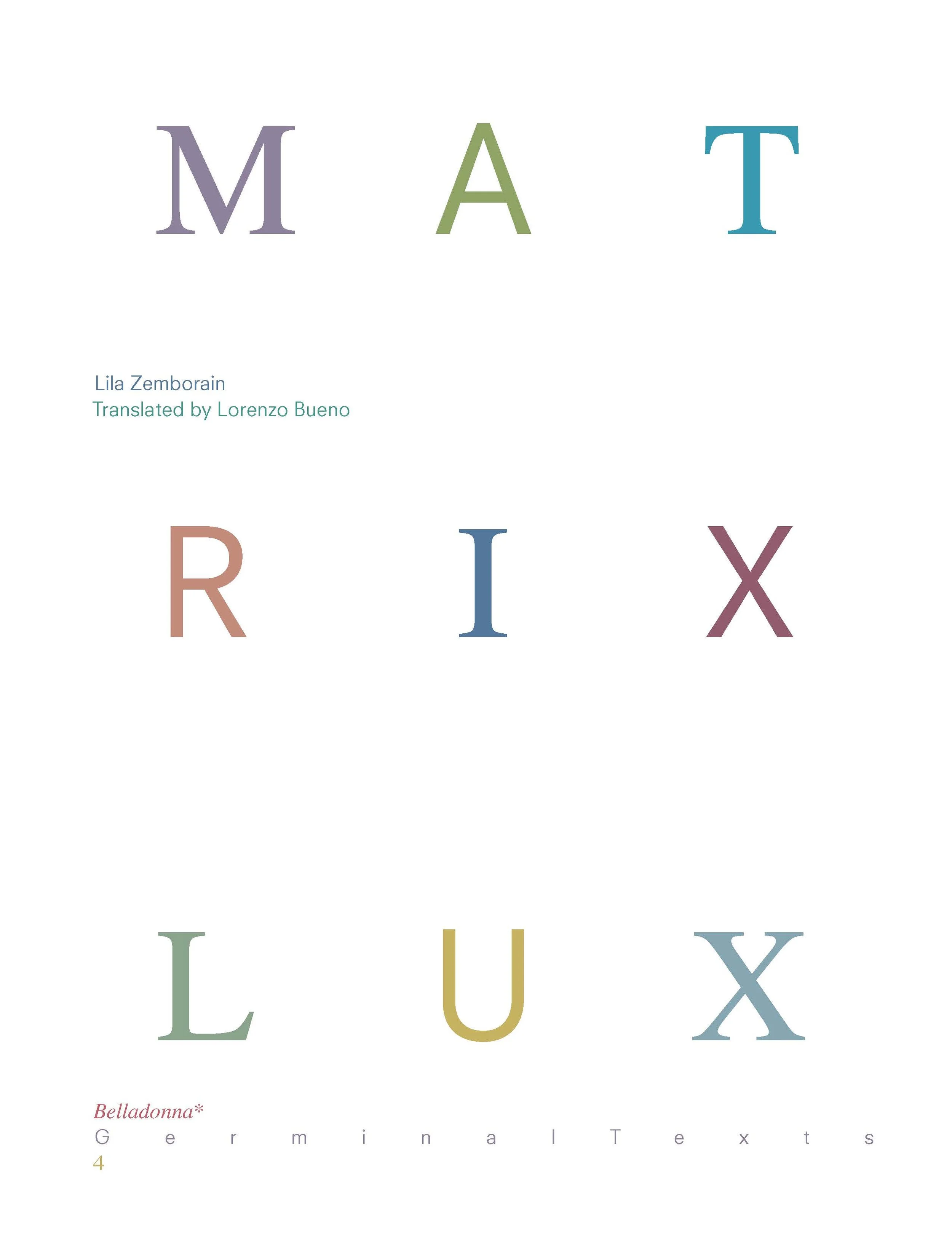Matrix Lux, this fourth book in the Germinal Texts series, is a bilingual edition of a poem sequence by the Argentine poet Lila Zemborain, translated from the Spanish by her son, Lorenzo Bueno. The Spanish was first published in Zemborain’s collected works, also titled Matrix lux (Bajo la Luna, 2019). Matrix Lux presents an extended meditation on illness, the body, and spirituality, as the author brings us into her solitary daily meditation practice during her cancer diagnosis and treatment. In entering the body, language, and motherhood at an unfettered and cellular level, Matrix Lux wrests itself away from received notions of gender, formulating instead an inter-lingual feminist ecology, a visceral tenderness. Language from healers, doctors, and spiritual guides form a netting through which Zemborain’s verse glides, passing also through the boundaries of the individuated body. An interview with Zemborain and her friend, the poet, translator, and editor Silvina López Medin, contextualizes the book within the poet’s life and oeuvre. The introductory translator’s note is at once a statement about the uncertainty and care work of translation and the mother/son relationship. In 2001, Zemborain published Belladonna* chaplet #17, Pampa, translated by Rosa Alcalá from Ábrete Sésamo debajo del agua (Último reino, 1993). Zemborain’s bilingual Mauve Sea Orchids (Belladonna* Series, 2007), translated by Mónica de la Torre and Rosa Alcalá, first pushed Belladonna* into its project of bookmaking.
Belladonna* Collaborative’s Germinal Texts trace feminist avant-garde histories and the poetic lineages they produce. Germinal Texts gesture to networks of affiliation, whether explicit or subterranean; to kinships and inheritances; to the unfolding of a text through its readership; and to always provisional origins without endings. These texts are presented with expanded front and back matter to encourage future engagements and feminist language ruckus.
PRAISE
Existing within a fluid liminality outside narrative time, Lila Zemborain’s Matrix Lux oscillates between meaty embodiment and the otherworldliness of illness. The poems read like a series of paintings that capture not moments, but states—ekphrases of an unseen self/subject, white light spilling over everything. Lorenzo Bueno’s translation of his mother’s encounter with mortality creates an almost unbearable intimacy that’s addictive. Like all relevant poetry these days, Matrix Lux offers an antidote to the fragmented banality of our digital age. —Dodie Bellamy
The pages of Lila Zemborain’s Matrix Lux glimmer and pulse with the (f)light of consciousness. A consciousness that directs the body’s complex biology – its material and spiritual communion. Each page offers a proliferation of thought, light, cells: mitosis taking place at the level of the fluctuating poetic line. Each line glowing, humming, casting vibratory nets to other pages / parts of the body. All working subdermally to reattune the body toward health. Matrix Lux is living. —Danielle Vogel
It is no stretch to speak of translation in terms of genetics, and in the case of Matrix Lux in particular, for it doubly contains bodies that share half of their DNA. If the cause of Zemborain’s exquisitely pared-down poems was the glitch in the translation of genes leading to cancer-inducing mutations, her son’s loving English versions, shaped by witnessing, prove restorative and healing. The resonances continue. As Benjamin would advise, Bueno’s translations do not block but rather receive and emit the originals’ curative light. Reader, behold faith’s glowing vessels! —Mónica de la Torre
Argentinian poet Lila Zemborain is the author of eight poetry collections, compiled in Buenos Aires as Matrix Lux: Poesía reunida 1989-2019, four of which have been published in English: Mauve Sea-Orchids (Belladonna*, 2007) translated by Rosa Alcalá and Mónica de la Torre; Guardians of the Secret (Noemi Press, 2009) translated by Rosa Alcalá; Soft Matter (Quantum Prose, 2023) translated by Christopher Winks, and now Matrix Lux. Since 2004 she has curated the KJCC Poetry Series at NYU, where she co-founded the MFA in Creative Writing in Spanish. In 2007 she was awarded a Guggenheim Fellowship for her three-book series Âlbum, to be published between 2024 and 2025 in Argentina.
Lorenzo Bueno is an American artist who was born in Buenos Aires in 1991. Bueno received his MFA in 2022 from Milton Avery Graduate School of the Arts, Bard College. Select solo and two person exhibitions include King’s Leap (New York, NY), Lubov (New York, NY), Baba Yaga Gallery (Hudson, NY) and Entrance (New York, NY). Select group exhibitions include Jack Hanley (New York, NY), Gems (New York, NY), King’s Leap at Room 3557 (Los Angeles, CA), Rumplestiltskin (New York, NY), and Canal Street Research Association (New York, NY). Recent performance work includes collaborations with Richard Maxwell, Keren Cytter, Gillian Walsh, Mara Mckevitt, and Emily Allan
